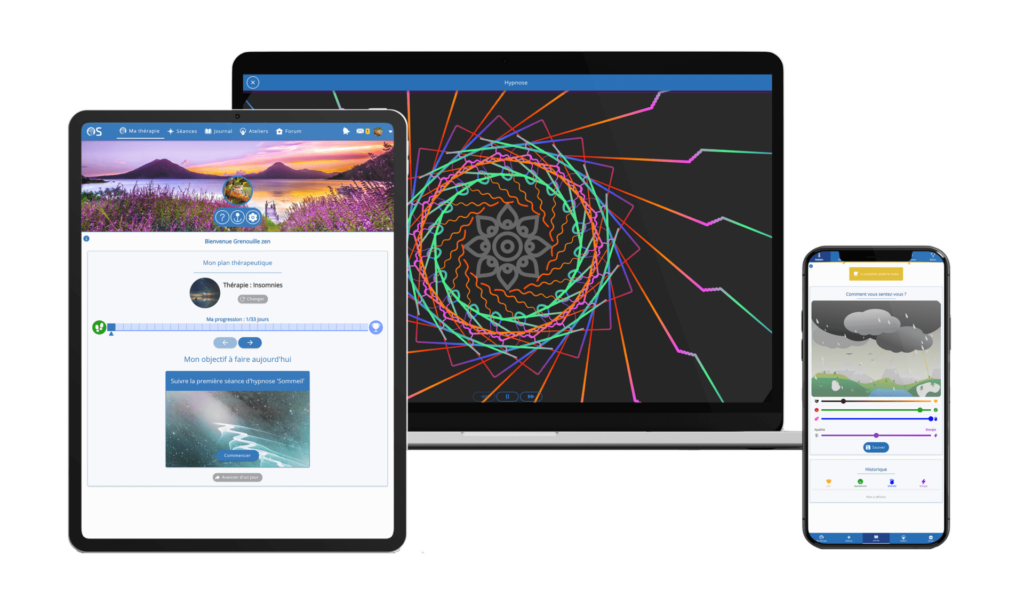Anxiety is a natural human reaction to the uncertainty of the future. In this article, we'll explore the reasons behind anxiety, its positive and negative effects, and strategies for managing it effectively.
What is anxiety?
Anxiety is a complex emotional reaction, often described as negative anticipation of future events. It manifests as feelings of fear, worry and tension. Although anxiety is often perceived as a negative state, it plays an essential role in our daily lives.
Biologically, anxiety activates our stress response system, preparing our body to deal with perceived threats. This response can be beneficial in situations of real danger, but it can also become problematic when inappropriate or excessive.

Types of anxiety
- Situational anxiety : Reaction to specific circumstances, such as an exam or presentation.
- Generalized anxiety : Persistent and excessive worry about various aspects of life.
- Phobias : Intense, irrational fears of specific objects or situations.
Exam anxiety
Exam anxiety is a common form of anxiety affecting many students. It usually manifests itself as an intense fear of failure, doubts about one's abilities and pressure to perform. This anxiety can have a significant impact on academic performance.
It's important to recognize that this kind of anxiety is normal. Many students experience a certain level of anxiety before an exam, which can even help them focus and prepare. However, when anxiety becomes overwhelming, it can interfere with performance.
Strategies for managing exam anxiety
- Suitable preparation: Good preparation can reduce anxiety. Revise regularly rather than procrastinating.
- Relaxation techniques : Practice breathing or meditation exercises to calm your mind before the exam.
- Positive visualization : Imagine passing the exam to boost your confidence.
The positive effects of anxiety
Although anxiety is often seen as an obstacle, it can also have positive effects. A certain amount of anxiety can act as a driving force, spurring us to action and preparation. It keeps us alert and motivated.

This positive anxiety can lead to better performance, whether in an academic, professional or personal context. It can also foster creativity by pushing us out of our comfort zone.
Examples of positive effects
- Performance improvement : Mild anxiety can boost concentration and productivity.
- Increased motivation : Anxiety can push us to achieve goals we've set ourselves.
- Resilience: Managing anxiety can strengthen our ability to face future challenges.
Anxiety as an engine for preparation
Anxiety can be seen as a motor that drives us to prepare for future events. It encourages us to train, organize and focus on our goals. Sometimes, a little anxiety is just what we need to get us going.

When we feel anxious before an important event, it can signal that we need to prepare ourselves more. This awareness can help us adopt proactive behaviors, such as studying for an exam or practicing a presentation.
How to turn anxiety into preparation
- Drawing up an action plan : Break tasks down into manageable steps to reduce anxiety.
- Set realistic goals: Clear goals can help channel anxiety into motivation.
- Celebrating small victories: Acknowledging progress can ease anxiety and boost confidence.
The disadvantages of anxiety
Although anxiety can have beneficial effects, it also has its drawbacks. Excessive anxiety can lead to mental and physical health problems, affecting our quality of life. It's crucial to recognize the signs of chronic anxiety.

People suffering from severe anxiety may experience symptoms such as insomnia, concentration problems and muscle tension. These symptoms can interfere with daily activities and interfere with relationships.
Consequences of excessive anxiety
- Mental health problems : Chronic anxiety can lead to disorders such as depression.
- Impact on performance : Performance at work or school can suffer.
- Physical effects: Anxiety can lead to headaches, digestive disorders and other health problems.
Putting the anxiety-inducing event into perspective
The first step to managing anxiety is to put the event that triggers it into perspective. Often, we tend to exaggerate the importance of a situation, which amplifies our anxiety. By taking a step back, we can assess the situation more objectively.
It's useful to ask yourself some key questions: How likely is it that this event will actually occur? What would be the real consequences? By answering these questions honestly, we can reduce the emotional burden associated with the event.
Techniques for putting things into perspective
- Taking a step back : Imagine yourself in a few months' time. Will this situation still be important?
- Writing your thoughts : Write down your concerns so you can analyze them more clearly.
- Chatting with a friend : Talking about your concerns can offer a different perspective.
A little anxiety is good for you
It's essential to recognize that a certain amount of anxiety can be beneficial. It acts as a driving force, encouraging us to act and prepare. Without anxiety, we could become apathetic in the face of challenges.
This constructive anxiety helps us stay focused on our goals. It can also push us to push ourselves beyond our comfort zone and explore new opportunities.
The benefits of moderate anxiety
- Improved concentration: A little anxiety can sharpen our focus and concentration.
- Increased motivation : Anxiety can encourage us to reach our goals and work harder.
- Optimum preparation : It pushes us to prepare adequately for the challenges ahead.
The dangers of excessive anxiety
On the other hand, excessive anxiety can have a detrimental effect on our mental and physical health. It can lead to disorders such as generalized anxiety, depression or even physical health problems.

It's crucial to recognize the signs of over-anxiety, so we can take proactive steps to manage it. Ignoring these signs can lead to a downward spiral that affects every aspect of our lives.
Consequences of excessive anxiety
- Mental health problems : Chronic anxiety can aggravate disorders such as depression.
- Impact on daily life : Daily activities can become overwhelming.
- Physical symptoms : Headaches, digestive disorders and other health problems can occur.
Anxiety management techniques
There are a number of effective techniques for managing anxiety. These methods can help reduce stress and improve our general well-being. By integrating these practices into our daily lives, we can better cope with challenges.

Common techniques include meditation, deep breathing and physical exercise. Each of these methods has its own advantages and can be adapted to suit individual needs.
Anxiety management methods
- Meditation: Practicing mindfulness can help calm the mind.
- Physical exercise : Physical activity releases mood-enhancing endorphins.
- Deep breathing : Breathing exercises can reduce stress instantly.
Using apps to manage anxiety
With the advent of technology, many apps have been developed to help manage anxiety. These tools can provide resources, relaxation exercises and practical advice, making anxiety management accessible to all.

Applications such as Open Synapse offer sophrology and guided meditation techniques. These tools can be integrated into daily routines to help maintain a positive state of mind.
Benefits of anxiety management applications
- Accessibility : The applications are available on mobile, so they can be used at any time.
- Customization : Users can choose exercises to suit their specific needs.
- Progress monitoring : Some applications allow users to track their progress over time.














































